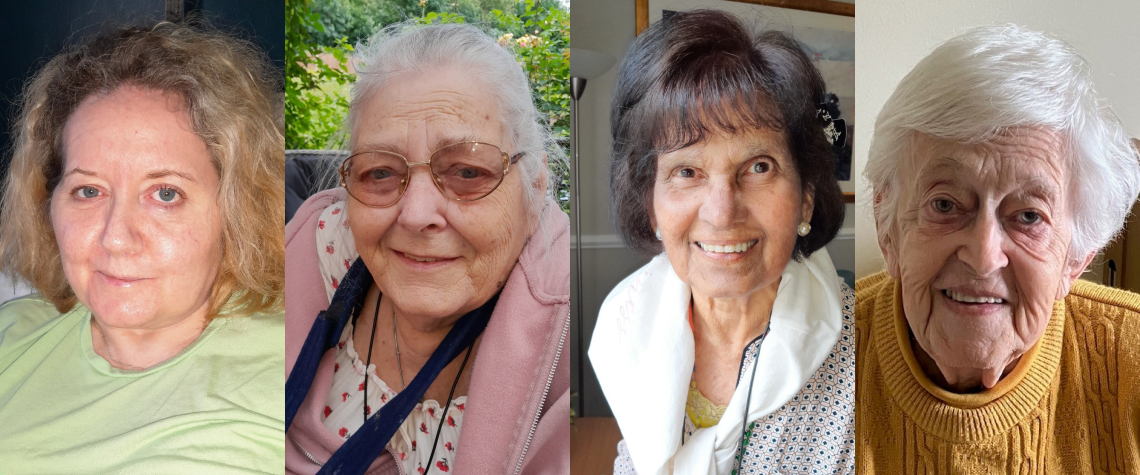Press release
Care home residents reveal their secrets for self-care in older age

What’s the key to looking and feeling good in old age?
Is it daily pampering , socialising, sleeping well, or something more? We’ve surveyed 75 residents across Bupa care homes† to discover their beauty secrets and what they associate with ageing well.
Self-care secrets
Self-care secret 1:
Keep a simple skin routine
A third of residents moisturise their skin every day
Residents, Ursula, 83, Sheila, 91, and Mary, 96, were passionate to advise exactly what to wash your face with too, stating that soap should never be used!
However, another Eileen, 88, reminds everyone of something very important, no matter what your age is: “suncream is a must!”.
Self-care secret 2:
Older skin can change: Adapt
your beauty routine as needed
Over half of female residents have adapted their beauty routine as they’ve got older
It’s not uncommon for your skin to change when you get older. Alma, 82, says: “skin needs more attention when you get older – more washing, cleansing, toning and moisturising.”
Rita, 80, notes that her skin is dry now. Elizabeth, 87, and Margery, 97, both prioritise daily moisturising to combat drier skin.
Self-care secret 3:
Only wear makeup if you want to
Three in 10 female residents told us they still wear makeup regularly, though others save for special occasions
Two in 10 of those surveyed told us that they used to wear makeup, but don’t anymore.
Patricia, 80, expressed: “[I’ve] got “[less] interest in beauty as I’ve got older.”
Wendy, 81, feels liberated to go barefaced, saying: “I don’t feel the need”.
Pamela, 87, likes to use makeup to help her feel more confident in appearance and “to hide [her] wrinkles”!
Self-care secret 4:
If you’re going to make an impact, choose lipstick
When asked what makeup product is the most important to them, lipstick was by far the best makeup for older women – with red and mauve shades getting special mentions.
Lip balm, foundation, mascara and nail polish were all mentioned as go-to products, too.
Self-care secret 5:
Know your recommended hours of sleep by age
As you get older, the amount of sleep you need changes. Once you reach 65, you actually need slightly less sleep than you do when you’re younger – by about an hour.
Get into a good sleep routine to make sure you’re able to make the most of each day. Spending too much time using smart screens, excessive alcohol consumption, smoking and caffeine can all make it harder to sleep well. Find out more about sleeping better in older age.
Self-care secret 6:
Learn how to relax
Four in 10 respondents say music, radio or friends and family help them relax most
Spending time relaxing is an important way to take care of yourself. But one person’s version of relaxation may look different to another’s. Our survey highlighted a number of creative and personal ways our care home residents like to relax, including Pamela, 89, who likes “to go on stage and sing”.
Audrey, 89, says her daily indoor walks help her to relax, whilst Noel, 95, likes to walk in the garden to keep him calm. Meanwhile, Margery, 97, likes to listen to the sport to unwind. David, 79, also cited a particular sport that helps him relax – football!
Keith, 90, shows creativity and daydreaming can do the trick, saying “photography and fantasising” keep him relaxed. Brian, 84, says the home’s visiting entertainers help to keep him to unwind and keep well-rested.
The younger age range of our residents shared marked differences in what helps them relax, with Ian, 52, and Richard, 51, sharing that watching videos and spending time on their personal electronic devices is what helps them relax best.

Self-care secret 7:
Do what works for you
Whilst there many ways to relax that unite us, our residents have shown us that self-care can look different for everyone. Here are some of our resident’s unique self-care tips:
- "Eat more cake” – Christopher, 85.
- "Take your time, never rush, enjoy what you do” – Keith, 90.
- "Just take things as they come” – Rita, 100.
- "Be kind to yourself. Focus on a positive attitude.” – Julie, 97.
Our resident’s top 10 ways to relax
1. Listening to music
2. Catching up with friends and family
3. Reading
4. Gentle exercise
5. Puzzles and games
6. Meditation or massage
- 7. Creative hobbies (7%)
- 8. Gardening (6%)
- 9. Baking (5%)
- 10. Spending time outdoors (1%)
Help when you need it
Choosing a care home can be stressful, especially if you’ve never done it before. Where do you start? Well, right here. Our helpful, understanding customer care team offer free advice on anything from funding to finding the right home.
Call a customer care adviser on 0345 600 4622^
Ask us to assess your situation and talk to you about how to pay for care.
Find care homes that might be right for you, and book one or more visits.

^We may record or monitor calls.
†A total of 75 residents were surveyed across Bupa’s UK care homes. These care homes include:



